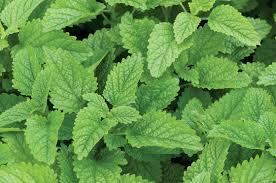 Lemon Balm is an herb that has been used to treat anxiety and insomnia for a very long time. It contains certain chemicals that have the ability to sedate the user and produce profound feelings of relaxation, making it one of the best natural anxiety/insomnia remedies out there.
Lemon Balm is an herb that has been used to treat anxiety and insomnia for a very long time. It contains certain chemicals that have the ability to sedate the user and produce profound feelings of relaxation, making it one of the best natural anxiety/insomnia remedies out there.
One study done using lemon balm on humans showed that people were able to reduce their anxiety levels by as much as 72%, which is extremely high. It has also effectively put many people to sleep across clinical trials.
Lemon Balm Benefits
Lemon balm benefits are felt most powerfully by people with anxiety or sleep disorders, which is most likely due to the fact that these people tend to be GABA deficient, and lemon balm boosts GABA levels.
GABA is a neurotransmitter that decreases activity in the brain. Therefore, without enough GABA being produced, you may have an overactive brain, which leads to high anxiety levels and inability to fall asleep. If you have trouble sleeping, you can definitely benefit from more GABA, and lemon balm is one of the most efficient boosters of this calming neurotransmitter. Another great GABA booster is passionflower.
Here is a list of the main lemon balm benefits:
- Improves mood
- Decreases brain activity
- Reduces anxiety
- Boosts GABA levels
- Helps induce sleep
- Promotes feelings of calm and relaxation
Lemon Balm Tea Vs. Lemon Balm Supplements
You’ve probably heard of people drinking chamomile tea at night to help them fall asleep, but most people don’t know that lemon balm tea can often be just as effective, if not even more effective. However, is consuming lemon balm in the form of tea really the best way to go about utilizing this potent herb?
Our opinion is that lemon balm supplements our much better than tea because of the fact that the dosage of lemon balm is much higher when taken in the form of a supplement as opposed to a tea. If you drink lemon balm tea, you will definitely experience some benefits, but it simply is nowhere near as powerful as taking a lemon balm supplement.
While the main difference between the two options is the level potency, there’s also a couple of other things to consider. If you don’t like the taste of tea, then you should definitely opt for a supplement instead because lemon balm tea does not taste very good. Additionally, do you have time to sit around and drink a hot cup of tea, or would you prefer to just pop a capsule and go to sleep?
Some people enjoy drinking tea, but the much more potent and convenient option is to take lemon balm in the form of encapsulated powder.
Lemon Balm For Sleep
Most people talk about lemon balm as an anxiety supplement, but it’s actually even more effective when used as a sleep supplement. If you take a large enough dosage, lemon balm can be excellent for sleep. An overactive brain is one of the biggest causes of an inability to fall asleep, which is why a solid GABA boost via lemon balm produces huge benefits.
Using it on its own is not necessarily ideal, but it can be effective. We prefer using lemon balm for sleep as part of a comprehensive formula.
Lemon Balm Side Effects
As with most natural, herbal supplements, lemon balm is very unlikely to produce any side effects. Side effects are typically only a concern with prescription medications. It is possible for natural substances to produce side effects, but generally, it is pretty uncommon.
Some of the lemon balm side effects that have been reported in rare instances are dizziness, nausea, vomiting, and abdominal pain. Again, it is not common for these to be experienced, but it’s still important to know that it’s possible.
Conclusion: Should You Use Lemon Balm For Sleep?
Lemon balm is one of the best natural supplements available for inducing sleep and relieving anxiety. We tend to stay away from single ingredient solutions to problems since that can often lead to your bodybuilding a tolerance, but using lemon balm as part of a comprehensive formula has proven itself to be tremendous for insomniacs.
I’m not just a supplement analyst. I’m an extremely qualified one! I am a Certified Nutrition Coach (CNC) and actually received my certification directly from the National Academy of Sports Medicine. I am also a Nutrition & Wellness Consultant, certified by the American Fitness Professionals Association (AFPA).

